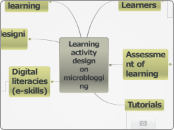Learning activity design
on microblogging
Engaging Learners
Building communities
Learning
Practice

Assessment of learning

Tutorials

Authentic learning
Redesigning

from a learner

from a teacher
Digital literacies (e-skills)


Based on JISC, Effective Practice in a Digital AgeA guide to technology-enhanced learning and teaching, http://www.jisc.ac.uk/media/documents/publications/effectivepracticedigitalage.pdf, 2009
critical reflectionacademic topics
Building communities
Learning
Online community facilitated by a tutor (private or public groups)
Practice
Exploring new topics / contexts

Engaging learning experiences through:digital audio (podcasting, reconrding interviews etc.)video (live), lifestreamingscreencapture application, screencastingself-assessment (polls and quizzes)offer:a more personal and potentialy less time feedbackimproving the quality of feedback method


Supporting learning in REAL enviroments / situations with different multimedia objects and resources posted online, through MOBILE devices.
Rethinking learning resources / multimedia objectsRedesigning curriculum

from a learner

from a teacher
Preparing students for a digital world: students develop critical ad professional (sometimes theoretical) e-skills through use and evaluation of different Web 2.0 technologies present in cirip, like: flickr, slideshare, voicethread, podcasting, live video, screencasting etc.
